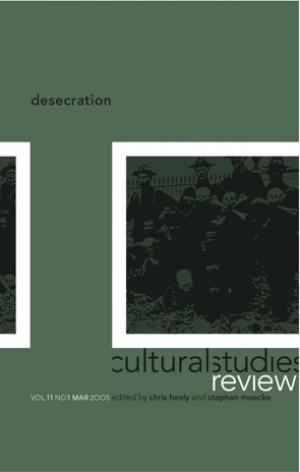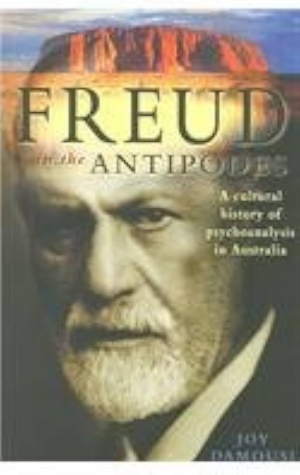Joy Damousi
Melinda Harvey reviews ‘Cultural Studies Review: Desecration vol. 11, no. 1’ edited by Chris Healy & Stephen Muecke and ‘Australian Historical Studies vol. 36, no. 125’ edited by Joy Damousi
Evil empire or fellow citizen? It seems to me that the arguments and counterarguments about America’s role in the world today run parallel to the debates concerning cultural studies’ standing in the humanities. It’s a thought that would have Raymond Williams rolling in his grave, of course. As an academic discipline, cultural studies was born Marxist, and reared to champion the local, the underdog, the oppressed. But intervention of all kinds, good and bad, is a form of influence. Act on behalf of others and for every round of applause, there’ll be a competing cry of indignation. Perhaps I should declare my hand? I’ve been in and out of English departments for the last fifteen years. I feel a sense of overwhelming gratitude to cultural studies for loosening literature from New Criticism’s explication de texte. That said, I mourn the loss of a community of readers that the canon – and the existence of English departments, discrete unto themselves – ensured. I also baulk at the idea that readers are mere consumers – that catch-all term – as if curling up with a novel was experientially no different to eating, shopping or watching television.
... (read more)Ron Spielman reviews ‘Freud in The Antipodes: A cultural history of psychoanalysis in Australia’ by Joy Damousi
Freud in the antipodes? Who cares? Well, I for one am very pleased that Joy Damousi, a professor of history at the University of Melbourne, cares enough to have assembled this compendium of historical information about the influence of Sigmund Freud’s ideas in Australian circles over the past one hundred years.
... (read more)Stephen Garton reviews 'Living with the Aftermath: Trauma, nostalgia and grief in post-war Australia' by Joy Damousi
A brief moment of reflection on the quantum of grief in Australia associated with wars of the twentieth century is, to say the least, unsettling. Nearly 100,000 killed in combat, many seriously wounded, many dealing with the physical and mental consequences long after the cessation of hostilities. Lives snatched from the everyday and made into noble sacrifices. The darker dimensions of the Anzac legacy have seeped into the national imagining in recent years, and we are now more open to the poignant melancholy of remembrance, undercutting the bellicose flag-waving of former years. But our sense of the costs of sacrifice has largely been focused on those who served. Joy Damousi in this and her previous book, The Labour of Loss (1999), opens our eyes to those others who have borne the pain of grief most acutely: the wives and families of those killed and those forever transformed by the experience of battle. These illuminating books are a long overdue acknowledgment of the burden of mourning that many Australian families have had to bear.
... (read more)In a recent history of punishment in Australia, Mark Finnane observes that there is a ‘seemingly inexhaustible vein of convict history’. This has been especially true most recently of the history of convict women and the increasing number of accounts which are now being published in this field is to be welcomed. These studies offer a corrective to histories which have relegated convict women to a footnote, and, perhaps more significantly, some historians have attempted to reconceptualise and recast our understandings of colonialism, gender, power, and sexuality during the nineteenth century.
... (read more)Joy Damousi reviews ‘Barmaids: A history of women’s work in pubs’ by Diane Kirkby
No icon better encapsulates the ethos of male culture than the pub. Sharing a beer in this bastion of male conviviality has been a defining experience in shaping Australian male identity. The pub as a cultural and social institution has attracted the attention of many historians, but none have considered the ubiquitous and yet mysteriously anonymous figure of the barmaid. Although represented in fiction and film, and up until recently, a part of the very fabric of pub culture, the barmaid remains an elusive figure in Australian history.
... (read more)Emma Floyd reviews 'Depraved and Disorderly: Female sexuality and gender in colonial Australia' by Joy Damousi
Much of the evidence and source material used in Depraved and Disorderly, particularly in Part One, will be familiar to the scholar of female convict history. But Joy Damousi provides some additional material which is both original and evocative. For example, her discussion of lesbianism and tattooing as both challenging to contemporary concerns about sexuality and social order, and as another means by which these women could express their own identities, provides evidence of the diversity of characters among convict women, as well as broadening our understanding of colonial society. More importantly, however, Damousi adds a further theoretical dimension to the already complex and contradictory historiography which surrounds the female convict.
... (read more)Jeff Grey reviews 'Gender and War: Australians at war in the twentieth century' edited by Marilyn Lake and Joy Damousi
The serious academic study of war has grown considerably in Australia in the last ten to fifteen years, bringing with it an often welcome diversification in focus and a willingness to subject old issues to fresh scrutiny. One sign of the increasing acceptance of war as a subject of serious study in the universities is the increasing number of university historians and other who, with little knowledge of or interest in the mechanics of war, nonetheless extend their work to include consideration of war and the military as these affect their particular areas of interest.
... (read more)






